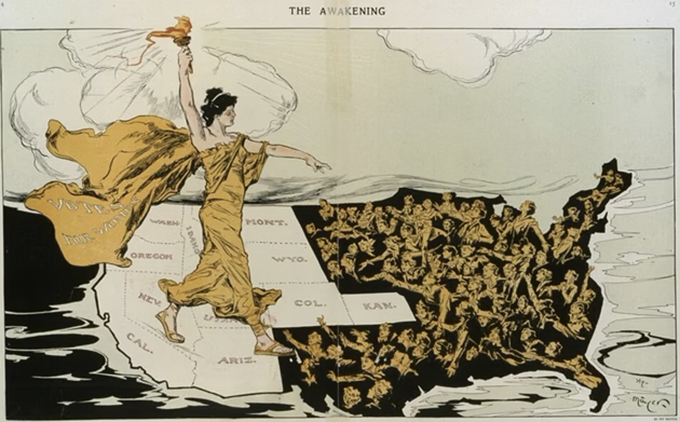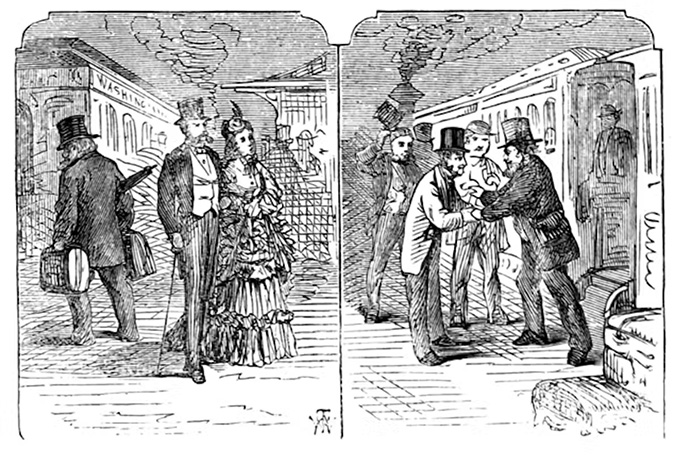 At his inauguration on January 20, 2025, Trump affirmed his desire to recreate a “new American Gilded Age.” A few days later, he made this unexpected reference to the period from the 1870s to the 1890s, known as the Gilded Age : “The United States was at its richest from 1870 to 1913. That’s when we were a tariff-heavy country.”
Trump’s autocratic and libertarian choices thus reflect a desire to resurrect a past. Why this fascination, with Trump going so far as to proclaim his admiration for McKinley (1896-1900), the Republican president who symbolized an aggressive tariff policy?
At his inauguration on January 20, 2025, Trump affirmed his desire to recreate a “new American Gilded Age.” A few days later, he made this unexpected reference to the period from the 1870s to the 1890s, known as the Gilded Age : “The United States was at its richest from 1870 to 1913. That’s when we were a tariff-heavy country.”
Trump’s autocratic and libertarian choices thus reflect a desire to resurrect a past. Why this fascination, with Trump going so far as to proclaim his admiration for McKinley (1896-1900), the Republican president who symbolized an aggressive tariff policy?
The Reign of the Robber Barons
For former Labor Secretary Robert Reich , the three decades of the Gilded Age saw an unprecedented and unique economic boom. The US national product increased sixfold; average annual growth was around 4% , despite severe and repeated financial crises. In the 1890s, industrial production in the United States exceeded that of the United Kingdom. By 1913, it was equal to that of the United Kingdom, Germany, and France combined. By exploiting the immense resources of a conquered American territory, the growth of the railway and steel industries quickly became exponential. The number of kilometers of railway increased sevenfold during this period. Then, driven by technological advances, the emergence of new sectors such as the chemical and mechanical industries, as well as electricity, quickly reinforced an overall dynamic fueled by a constant influx of immigrants and the contribution of foreign capital, most often British. Beyond these enviable figures, it was above all a period in which, at the heart of an economy protected by very high customs tariffs, the “Robber Barons” – Rockefeller, Carnegie, Morgan or Westinghouse – built gigantic monopolies.Inequality according to Mark Twain
Named the “Gilded Age” after the 1873 satirical novel co-written by Mark Twain , this era was one of phenomenal growth in inequality. In 1890, 10% of Americans owned 90% of the nation’s wealth. The Gilded Age saw the rise of the power and ostentatious behavior of a few dozen techno-entrepreneurs at the head of monopolies, on the one hand. On the other, the population’s greater precariousness, very well depicted in the photos of the New York slums by activist journalist J. Riis . Behind Trump’s flurry of wild statements, his brutal policies and his decrees aimed at societal reforms, there is a constant ideological obsession: the search for the ingredients that make up the Gilded Age .Imperialist nationalism
Mimicking the isolationist policies of the Gilded Age, Trump’s second term is initially marked by fierce nationalism symbolized by the revival of the slogan “America First.” A phrase uttered by President Woodrow Wilson, who did not want to participate in the First World War. As Trump’s announcements demonstrate, American priorities are non-negotiable. They can also include a highly offensive foreign policy: the imposition of imperialist neo-mercantilism, that is, a logic of bilateral power relations, where trade becomes an instrument of power, or even domination, over other countries.
Illustrations from The Gilded Age , by Mark Twain (1873). Wikimediacommons , CC BY-SA
Plutocracy of techno-entrepreneurs
During the Gilded Age, the “Robber Barons” or “great feudal lords” of capitalism became extremely wealthy monopolistic captains of industry. By 1890, Rockefeller was the richest billionaire in the United States. Standard Oil of Ohio controlled 90% of oil production and refining. Its control of the oil market increased from 4% in 1870 to 25% in 1874 and over 85% in 1880. Ultimately, some twenty Robber Barons completely dominated a politically predatory capitalism ; a system of widespread corruption where unscrupulous businessmen benefited from political favors and made no secret of it. This dominance of techno-entrepreneurs is just as striking today. Like their predecessors, the tech billionaires of the 2020s, such as Musk, Bezos, and Zuckerberg, fund political campaigns and “receive” favors in return. Elon Musk helped finance Trump’s election campaign . In return, he has received “at least $38 billion in government contracts, loans, grants, and tax credits over the years, often at critical times,” according to the Washington Post . In this quest for a new Gilded Age, plutocracy has a true trademark. Yesterday, it was ideologically combating the idea of a state intervening in the economy; today, it’s conquering it in order to use it, as Musk demonstrates every day.Violent political climate
In both cases, the establishment of a resolutely violent political climate makes it possible to impose a favorable moral order, but also a favorable social order. During the Gilded Age, the moral struggle focused on the issue of alcohol prohibition. Socially, strikes were bloodily suppressed, such as the Homestead Strike of 1892 and the Pullman Strike of 1894. Today, the search for a moral order is currently focused on societal issues, particularly gender issues. The social front is not deserted. In 2024, Donald Trump congratulated Elon Musk “for having fired 80% of Twitter’s workforce since he took control in October 2022.” By 2025, in the same spirit, he encouraged Musk to undertake the brutal reduction of the federal government’s workforce. At its heart, the approach lies in the words of one of the most famous Robber Barons , Cornelius Vanderbilt, nicknamed the Commodore for having built his fortune in shipbuilding:“The people be damned. Why should I care about the law, don’t I have the power?” (in Frank Browning and John Gerassi, A Criminal History of the United States , New World Publishing, 2015, pp. 277-278).Crushing public power, the fascination for absolute power of tech entrepreneurs is never far away.